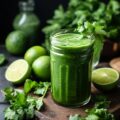Introduction: A Mindful Approach to Juice Cleansing
Juice cleansing has gained popularity as a way to reset the body and mind, but it’s important to approach it with care and awareness. Hayden Slater, founder of Pressed Juicery, offers valuable insights on how to prepare for a juice cleanse in a way that nourishes both body and spirit. This article explores compassionate and balanced methods to embark on a juice cleanse journey, emphasizing wellbeing over strict rules or optimization.
Understanding the Purpose of a Juice Cleanse
Before diving into a juice cleanse, it’s crucial to reflect on your motivations and set realistic expectations. A juice cleanse isn’t about deprivation or punishment, but rather an opportunity to pause, reset, and reconnect with your body. Slater emphasizes that the goal should be to feel refreshed and renewed, not depleted or stressed.
Consider a juice cleanse as a gentle reset button for your digestive system and an opportunity to flood your body with nutrients. It’s a chance to break unhealthy eating patterns and cultivate mindfulness around food choices. Remember, the journey is just as important as the destination.
Preparing Your Body and Mind for a Cleanse
To avoid the dreaded “juice fast delirium” and ensure a positive experience, proper preparation is key. Slater recommends a gradual approach:
- Start reducing caffeine, alcohol, and processed foods a week before your cleanse
- Increase your intake of fruits, vegetables, and water in the days leading up to the cleanse
- Practice mindful eating and pay attention to your body’s signals
- Get plenty of rest and manage stress through meditation or gentle exercise
By easing into the cleanse, you’re setting yourself up for success and minimizing potential discomfort. Remember, this is about nurturing your body, not punishing it.
Choosing the Right Juices for Your Cleanse
When selecting juices for your cleanse, variety is key. Slater emphasizes the importance of a balanced approach, incorporating a mix of green juices, fruit-based juices, and nut milks. This ensures you’re getting a wide range of nutrients and helps keep your energy levels stable throughout the day.
Some beneficial ingredients to look for in your juices include:
- Leafy greens like kale and spinach for vitamins and minerals
- Lemon and ginger for digestive support
- Beets for liver support and natural sweetness
- Nut milks for healthy fats and protein
Remember, listen to your body. If a particular juice doesn’t agree with you, it’s okay to make adjustments. The goal is to feel nourished and energized, not restricted.
Navigating the Cleanse with Compassion
During your juice cleanse, it’s normal to experience a range of emotions and physical sensations. Slater encourages approaching these experiences with curiosity and compassion. Some tips for a mindful cleanse experience:
- Practice self-care rituals like gentle yoga, meditation, or journaling
- Stay hydrated with water and herbal teas between juices
- Listen to your body and rest when needed
- Avoid overexertion; gentle walks or stretching are ideal forms of movement
- Connect with others for support, whether it’s friends doing the cleanse with you or online communities
Remember, a juice cleanse is not about perfection. If you feel the need to eat solid food, choose light, plant-based options. The goal is to feel good, not to adhere to strict rules.
Transitioning Back to Solid Foods
As your cleanse comes to an end, it’s important to reintroduce solid foods gradually. Slater recommends starting with easily digestible foods like fruits, steamed vegetables, and light soups. This gentle transition allows your digestive system to readjust and helps you maintain the benefits of your cleanse.
Use this time to reflect on your cleanse experience and the insights you’ve gained about your body and eating habits. Many people find that a juice cleanse helps them develop a greater appreciation for whole, nutrient-dense foods and mindful eating practices.
Frequently Asked Questions
1. How long should a juice cleanse last?
The duration of a juice cleanse can vary depending on individual needs and goals. Slater recommends starting with a 1-3 day cleanse for beginners. Longer cleanses should be undertaken with guidance from a healthcare professional.
2. Can I exercise during a juice cleanse?
Light exercise like walking or gentle yoga is fine during a cleanse, but intense workouts are not recommended. Listen to your body and prioritize rest and recovery.
3. What if I feel hungry during the cleanse?
It’s normal to feel hungry, especially in the beginning. Try drinking more water or herbal tea between juices. If hunger persists, it’s okay to have a small serving of fruits or vegetables.
4. Are there any side effects I should be aware of?
Some people may experience mild headaches, fatigue, or irritability, especially in the first day or two. These usually subside as your body adjusts. If you experience severe symptoms, it’s important to listen to your body and consider ending the cleanse early.
5. How often can I do a juice cleanse?
The frequency of juice cleanses depends on individual needs and lifestyle. Some people choose to do a short cleanse seasonally, while others may incorporate juice days into their routine more frequently. Always prioritize a balanced, whole-food diet as your primary nutrition source.
Conclusion: Embracing a Holistic Approach to Cleansing
Juice cleansing, when approached mindfully and with proper preparation, can be a rejuvenating experience for both body and mind. By following Hayden Slater’s advice and listening to your body’s needs, you can avoid the pitfalls of juice fast delirium and enjoy the benefits of a compassionate, nurturing cleanse. Remember, the goal is not perfection, but rather a gentle reset that leaves you feeling refreshed, renewed, and more in tune with your body’s needs. As you embark on your cleansing journey, carry this spirit of self-care and mindfulness with you, allowing it to inform not just your cleanse, but your overall approach to health and wellbeing.









